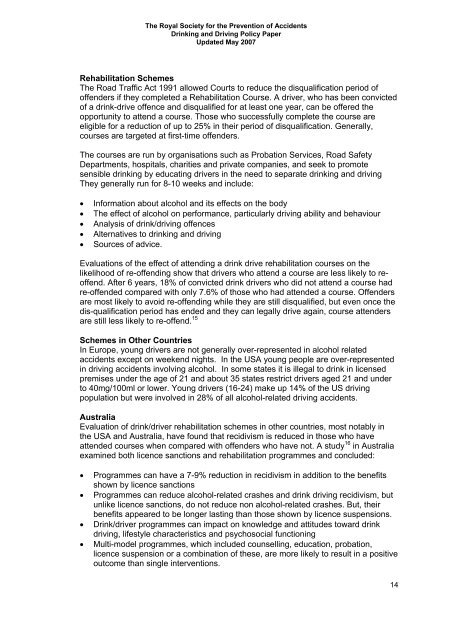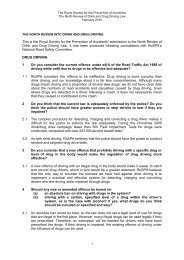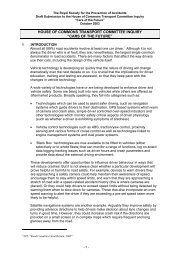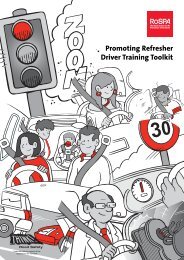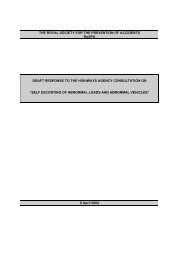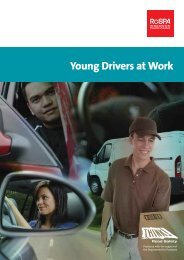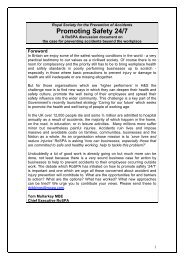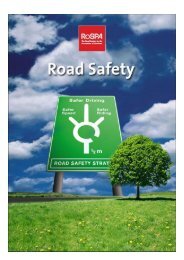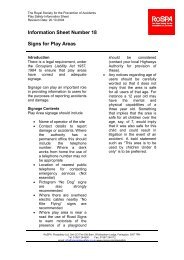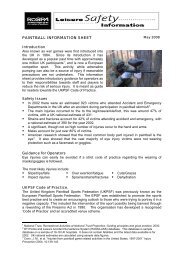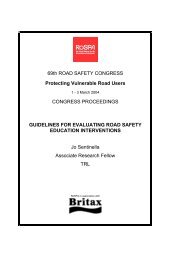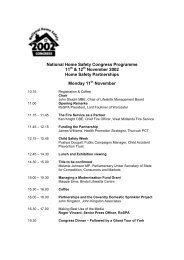RoSPA Drinking and Driving Policy Paper 2007
RoSPA Drinking and Driving Policy Paper 2007
RoSPA Drinking and Driving Policy Paper 2007
Create successful ePaper yourself
Turn your PDF publications into a flip-book with our unique Google optimized e-Paper software.
The Royal Society for the Prevention of Accidents<br />
<strong>Drinking</strong> <strong>and</strong> <strong>Driving</strong> <strong>Policy</strong> <strong>Paper</strong><br />
Updated May <strong>2007</strong><br />
Rehabilitation Schemes<br />
The Road Traffic Act 1991 allowed Courts to reduce the disqualification period of<br />
offenders if they completed a Rehabilitation Course. A driver, who has been convicted<br />
of a drink-drive offence <strong>and</strong> disqualified for at least one year, can be offered the<br />
opportunity to attend a course. Those who successfully complete the course are<br />
eligible for a reduction of up to 25% in their period of disqualification. Generally,<br />
courses are targeted at first-time offenders.<br />
The courses are run by organisations such as Probation Services, Road Safety<br />
Departments, hospitals, charities <strong>and</strong> private companies, <strong>and</strong> seek to promote<br />
sensible drinking by educating drivers in the need to separate drinking <strong>and</strong> driving<br />
They generally run for 8-10 weeks <strong>and</strong> include:<br />
• Information about alcohol <strong>and</strong> its effects on the body<br />
• The effect of alcohol on performance, particularly driving ability <strong>and</strong> behaviour<br />
• Analysis of drink/driving offences<br />
• Alternatives to drinking <strong>and</strong> driving<br />
• Sources of advice.<br />
Evaluations of the effect of attending a drink drive rehabilitation courses on the<br />
likelihood of re-offending show that drivers who attend a course are less likely to reoffend.<br />
After 6 years, 18% of convicted drink drivers who did not attend a course had<br />
re-offended compared with only 7.6% of those who had attended a course. Offenders<br />
are most likely to avoid re-offending while they are still disqualified, but even once the<br />
dis-qualification period has ended <strong>and</strong> they can legally drive again, course attenders<br />
are still less likely to re-offend. 15<br />
Schemes in Other Countries<br />
In Europe, young drivers are not generally over-represented in alcohol related<br />
accidents except on weekend nights. In the USA young people are over-represented<br />
in driving accidents involving alcohol. In some states it is illegal to drink in licensed<br />
premises under the age of 21 <strong>and</strong> about 35 states restrict drivers aged 21 <strong>and</strong> under<br />
to 40mg/100ml or lower. Young drivers (16-24) make up 14% of the US driving<br />
population but were involved in 28% of all alcohol-related driving accidents.<br />
Australia<br />
Evaluation of drink/driver rehabilitation schemes in other countries, most notably in<br />
the USA <strong>and</strong> Australia, have found that recidivism is reduced in those who have<br />
attended courses when compared with offenders who have not. A study 16 in Australia<br />
examined both licence sanctions <strong>and</strong> rehabilitation programmes <strong>and</strong> concluded:<br />
• Programmes can have a 7-9% reduction in recidivism in addition to the benefits<br />
shown by licence sanctions<br />
• Programmes can reduce alcohol-related crashes <strong>and</strong> drink driving recidivism, but<br />
unlike licence sanctions, do not reduce non alcohol-related crashes. But, their<br />
benefits appeared to be longer lasting than those shown by licence suspensions.<br />
• Drink/driver programmes can impact on knowledge <strong>and</strong> attitudes toward drink<br />
driving, lifestyle characteristics <strong>and</strong> psychosocial functioning<br />
• Multi-model programmes, which included counselling, education, probation,<br />
licence suspension or a combination of these, are more likely to result in a positive<br />
outcome than single interventions.<br />
14


